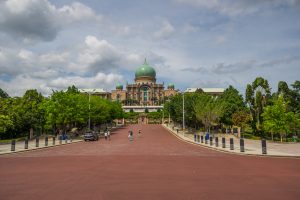The Sultan of the Malaysian state of Johor has issued a rebuke of the country’s political class, expressing concern over the recent “incessant reports regarding the stability of the current government.”
The rare political intervention by Sultan Ibrahim Ibni Almarhum Sultan Iskandar follows a report that parliamentarians from the once-dominant Barisan Nasional (BN) coalition were plotting to remove Prime Minister Anwar Ibrahim from his position via by-elections.
“The rakyat [people] placed high hopes in the recent GE and voted for 222 representatives to bring back political stability to the country,” Sultan Ibrahim wrote in a May 3 Facebook, as quoted by Channel News Asia. “But until today, the 222 members of Parliament cannot get on the same page with efforts made to derail the stability that is being carefully built.”
He added: “This is not healthy for the entire nation, whether socially, economically or even our standing internationally.”
Anwar took office following a general election in November. Many hoped that the election would mark an end to a period of unusual instability in Malaysian politics. Since the general election of 2018 broke a period of uninterrupted BN rule stretching back to independence in 1957, the country has had four prime ministers, including Anwar, and the collapse of the PH-led government in 2020 gave way to two years of unstable and unelected minority coalitions.
Instead, the election returned a hung parliament and for five days after the election, Anwar’s Pakatan Harapan (PH) coalition, which won 82 out of 222 parliamentary seats, vied with former Prime Minister Muhyiddin Yassin’s Perikatan Nasional bloc (74 seats) for the support necessary to form the next government. To get his coalition over the line, Anwar was forced into an unlikely alliance with BN, led by the once-dominant United Malays National Organization (UMNO), against which he had battled for most of his political career.
Given the fractious nature of this coalition, Anwar immediately called for a vote of confidence in his government. The members of his coalition agreed to a cooperation pact for a five-year term, promising to support him in the confidence vote and establishing a set of common principles to unite the multifarious coalition and ensure its stability.
On April 24, however, the news site The Vibes reported that a number of “disgruntled” BN parliamentarians were “currently being wooed by certain key individuals and persuaded to take part in a ‘do-or-die mission’ to quit their party and sacrifice their seats,” and to run for re-election with PN. The plot also reportedly involved getting parties from East Malaysia to join a new coalition led by PN.
After the report’s publication, BN’s supreme council said that it unanimously agreed to support Anwar’s government, while Bersatu, a member of the PN coalition, denied any plot to unseat Anwar.
Under an “anti-party hopping” law passed last year, MPs have to vacate their seat if they quit or cease to become a member of their political parties. The law was introduced in order in a bid to discourage politicians from switching parties, which had prompted the collapse of the PH-led coalition in 2020 and threatened to usher Malaysia into a state of permanent instability. The reports of plots to unseat Anwar, while unverified, only underline the necessity of such a law.
The Johor Sultan’s intervention reflects the growing political role of Malaysia’s nine royal families, from which the country’s king, or Yang di-Pertuan Agong, is chosen on a rotating basis. While these families have traditionally refrained from active involvement in politics or commenting on political matters, they became more vocal after 2020, as Malaysia’s political class has become absorbed by political bickering and maneuvering. For instance, the current king, Sultan Abdullah of Pahang, was forced to take a prominent role in mediating the country’s various political crises and has on several occasions called for politicians to put aside petty squabbles in the national interest.
While there was some hope that the BN-PH pact at the core of Anwar’s unity government would restore stability and predictability to Malaysian politics, it is now apparent that this cannot be taken for granted. With important state elections scheduled for the coming months, there will be ample opportunities for things to come undone.

































